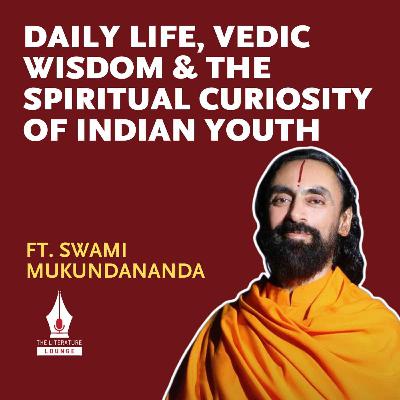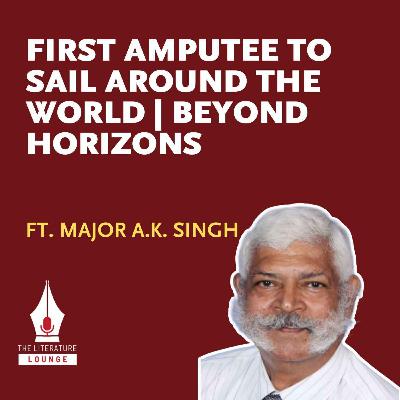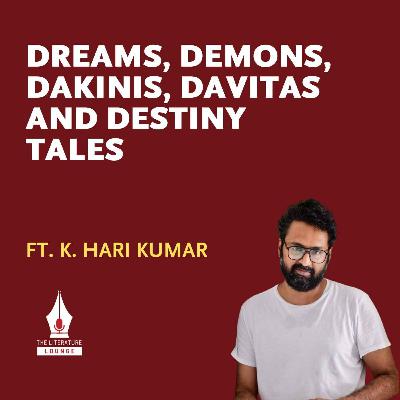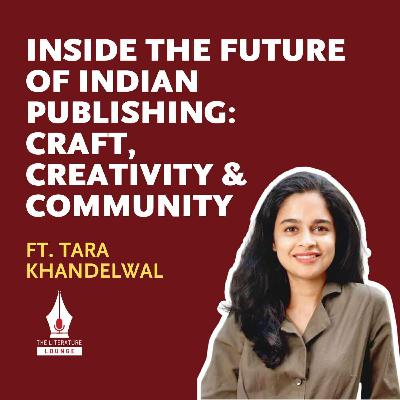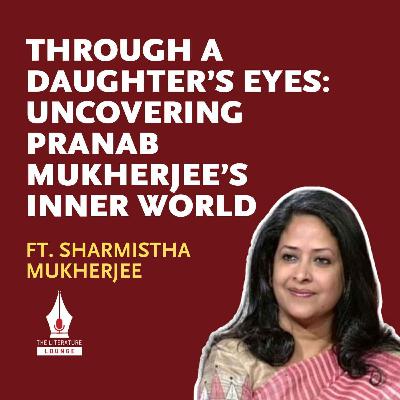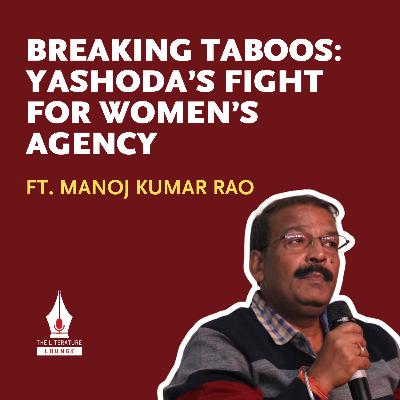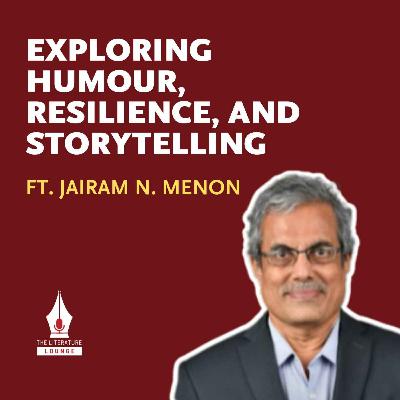Discover The Literature Lounge
The Literature Lounge

The Literature Lounge
Author: Mohua Chinappa
Subscribed: 4Played: 4Subscribe
Share
© 2025 @2025 The Literature Lounge
Description
The Literature Lounge, hosted by Mohua Chinappa is a popular podcast series dedicated to the world of books and the brilliant minds behind them. Through exclusive conversations, we uncover how authors craft captivating stories, thought-provoking essays, insightful biographies, provocative prose and poetry that spark possibilities within us.
From dreaming big to breaking conventions, each episode explores books that ignite fresh ideas – one page at a time. If you love literature, you’ll feel right at home here.
Hosted on Acast. See acast.com/privacy for more information.
46 Episodes
Reverse
In this episode of The Literature Lounge, author of ‘Tales of the Panchkanya’, Eika Chaturvedi Bannerjee, talks about the rich tapestry of feminine wisdom embodied by the Panchakanya – Ahalya, Draupadi, Kunti, Tara, and Mandodari delving into the timeless tales of these legendary figures, revealing their profound influence on Indian mythology and cultural heritage. Through an engaging discussion, she sheds light on the virtues, challenges, and resilience of these extraordinary women, providing insights into their enduring legacy. Join us as we journey through history, uncovering the deep-rooted significance of the Panchakanya and their relevance in contemporary times.Drawing from decades in the corporate world, rigorous engagement with ancient texts, and an intergenerational collaboration with her mother, Eika speaks about reclaiming mythology from moral simplification, restoring choice and consequence to women’s narratives, and making Indian wisdom relevant without diluting its depth.A conversation about stories as living memory, feminism beyond binaries, and wisdom as a way of being—not belief.What this episode is REALLY aboutNot mythology as fantasy.Not feminism as a slogan.Not wisdom frozen in the past.It’s about:Panchakanya reimagined: Ahalya, Tara, Mandodari, Kunti, and Draupadi as agents of choiceThe meaning of “Kanya”: Innocence, agency, and why purity narratives failMultiple truths in myth: How context reshapes stories across timeFeminism in Indian wisdom: Beyond victimhood, beyond binariesChoice and consequence: Living fully with decisions madeGender-agnostic themes: Rage, fidelity, power, withdrawal, and desireWriting in Hindi: Language as access, authenticity, and cultural memoryIntergenerational storytelling: Mother–daughter perspectives in authorshipCorporate life to conscious purpose: Eika’s journey across her “three lives”Ekam Resonance: Bringing ancient wisdom into contemporary leadership and lifeIf you’ve ever questioned the stories you were taught, wondered whose voices were softened or silenced, or felt the pull to return to wisdom without abandoning modernity—this episode offers rare clarity and courage.Support the PodcastIf this conversation stayed with you, share it with someone who believes stories are meant to be questioned—not just inherited.Subscribe for conversations on literature, culture, power, and consciousness—held with depth, nuance, and intention.Music Credits:(https://pixabay.com/music/ambient-butterfly-113600/)✅ Subscribe To Our Channel: / theliteraturelounge Stay updated!🔔Follow Us OnThe Literature Lounge► Instagram: / litlounge_pod ► LinkedIn: https://www.linkedin.com/company/the-literature-lounge/Connect with the Host: Mohua Chinappa►Instagram: / mohua_chinappa ►LinkedIn: / mohua-chinappa ►For any queries, EMAIL: hello@themohuashow.comCopyright ©2025 The Literature Lounge. All Rights ReservedDisclaimer: The views expressed by our guests are their own. We do not endorse and are not responsible for any opinions expressed by our guests on our Show and its associated platforms. Hosted on Acast. See acast.com/privacy for more information.
This episode of The Literature Lounge is a quiet yet powerful reflection on work, leadership, and inner discipline.In a deeply thoughtful conversation, author Richa Tilokani opens up about her unexpected journey into writing—one that didn’t begin with ambition, but with self-doubt, curiosity, and handwritten notes as she tried to make sense of Karm Yoga for herself. What started as a personal search slowly grew into her book, 7 Lessons of Karm Yoga, shaped by real questions about pressure, conflict, and imbalance in modern life. The book speaks gently but directly to anyone trying to find clarity and purpose while navigating the chaos of today’s world.This is not a conversation about renunciation or retreat.It is about living fully in the world—while managing the mind that moves through it.A dialogue on ambition without hostility, leadership without ego, and success without burnout.What this episode is REALLY aboutNot motivation slogans.Not spiritual bypassing.Not productivity obsession.It’s about:* Writing by accident: How self-doubt delayed creativity, and curiosity unlocked it* Karma Yoga explained simply: Why managing the mind matters more than managing people* Mindset management: Befriending the mind instead of letting it dominate you* The three gunas: How excess ambition and inertia harm society* Unsustainable growth: When Rajoguna and Tamoguna overpower Satvaguna* Detachment redefined: Letting go of ego, greed, anger—not family or responsibility* Leadership with purpose: Why true leaders grow with their teams and communities* Work-life balance: Why overwork is as harmful as underwork* Ego-driven conflict: From workplaces to politics* Vasudeva Kutumbakam: Why collective success matters more than individual gain* Ancient wisdom for modern problems: Addressing harassment, abuse, and diversity issues* A timeless Gita shloka: Focusing on duty, not just outcomesIf you’ve ever felt torn between ambition and peace, effort and exhaustion, success and meaning—this episode offers a grounded way forward.Support the Podcast If this conversation resonated with you, share it with someone navigating work, leadership, or burnout.Subscribe for more conversations rooted in clarity, wisdom, and lived experience.Music Credits:(https://pixabay.com/music/ambient-butterfly-113600/)✅ Subscribe To Our Channel: / theliteraturelounge Stay updated!🔔Follow Us OnThe Literature Lounge► Instagram: / litlounge_pod ► LinkedIn: https://www.linkedin.com/company/the-literature-lounge/Connect with the Host: Mohua Chinappa►Instagram: / mohua_chinappa ►LinkedIn: / mohua-chinappa ►For any queries, EMAIL: hello@themohuashow.comCopyright ©2025 The Literature Lounge. All Rights ReservedDisclaimer: The views expressed by our guests are their own. We do not endorse and are not responsible for any opinions expressed by our guests on our Show and its associated platforms. Hosted on Acast. See acast.com/privacy for more information.
This episode of The Literature Lounge is a raw examination of duty, conflict, and conscience.Join us for an exclusive conversation with Shri Prakash Singh, a legendary officer of the Indian Police Service, as he shares insights from his memoir, Unforgettable Chapters: Memoirs of a Top Cop.A conversation about the line between order and justice, and the weight of the uniform.What this episode is REALLY aboutNot just war stories.Not political theory.Not abstract ideals of service.It’s about:The moral calculus of counter-insurgencyCommanding men in the “shoot-to-kill” zones of Nagaland and PunjabFighting enemies outside the border and inertia within the systemTaking the Union and State governments to court for the sake of reformThe solitude of the honest officer in a political stormLeadership when your authority is questioned and your credibility weaponizedThe lifelong burden of decisions made in secondsDefining victory beyond the battlefieldIf you’ve ever wondered what it truly costs to hold the line, this episode has answers.Support the Podcast If this conversation moved you, share it with someone who needs to hear it today. Subscribe for more voices that rewrite the rules with truth, heart and courage.✅ Subscribe To Our Channel: / theliteraturelounge Stay updated!🔔Follow Us OnThe Literature Lounge► Instagram: / litlounge_pod ► LinkedIn: https://www.linkedin.com/company/the-literature-lounge/Connect with the Host: Mohua Chinappa►Instagram: / mohua_chinappa ►LinkedIn: / mohua-chinappa ►For any queries, EMAIL: hello@themohuashow.comCopyright ©2025 The Literature Lounge. All Rights ReservedDisclaimer: The views expressed by our guests are their own. We do not endorse and are not responsible for any opinions expressed by our guests on our Show and its associated platforms.#IndianPoliceService #PoliceReforms #TopCopMemoir #NationalSecurity #CounterInsurgency Hosted on Acast. See acast.com/privacy for more information.
This episode of The Literature Lounge is a sobering audit of the stories we are sold.Author Umesh Upadhyay, a veteran journalist with four decades across print, radio, TV, and digital, unpacks his book Western Media Narratives on India from Gandhi till now. He dissects the persistent lens of bias, born from his experience watching the skewed portrayal of India during the COVID-19 pandemic.A conversation about who controls the narrative, who inherits it, and the cost of a silent media.What this episode is REALLY aboutNot objectivity.Not neutrality.Not dry academic theory.It’s about:The hidden history behind today’s headlinesThe politics and racism embedded in Western coverageIndian media’s complicity in a flawed narrativeIsolation as inspiration: writing a book during a lockdownHow a legacy of bias stretches from Gandhi to the Ram MandirThe paradox of JNU: a past beacon vs. a present symbolWhy Indian success stories are often met with Western skepticismA practical toolkit for readers to challenge dominant narrativesThe future of India’s story and who gets to write itIf you’ve ever questioned why the world sees India the way it does, this episode has evidence.✅ Subscribe To Our Channel: / theliteraturelounge Stay updated!🔔Follow Us OnThe Literature Lounge► Instagram: / litlounge_pod ► LinkedIn: https://www.linkedin.com/company/the-literature-lounge/Connect with the Host: Mohua Chinappa►Instagram: / mohua_chinappa ►LinkedIn: / mohua-chinappa ►For any queries, EMAIL: hello@themohuashow.comCopyright ©2025 The Literature Lounge. All Rights ReservedDisclaimer: The views expressed by our guests are their own. We do not endorse and are not responsible for any opinions expressed by our guests on our Show and its associated platforms. Hosted on Acast. See acast.com/privacy for more information.
This episode of The Literature Lounge is an archaeological dig into the deep, forgotten fabric of India.Author Zilka Joseph excavates the 2,000-year story of the Bene Israel Jews—from their ancient arrival on the Konkan coast to the sweet, shared rituals that bind communities—revealing a history that predates modern nations and lives on in a handful of flattened rice.A conversation about the flavors that outlast empires and the quiet matriarchs who cooked a culture into being.What this episode is REALLY aboutNot a single narrative.Not an isolated identity.Not just recipes.It’s about:A 2,000-year-old community living in India centuries before it was “India”The shock of ancient roots: arrival in 175 BCE, woven into the Konkan coastSweet Malida: a ceremonial dish that cools the body and connects the spiritFood as shared language: coconut, festivals, and common tables with all neighboursThe unthanked mothers and grandmothers who are the true archivistsA global family: finding kinship with Jamaican, African, and all Jews of ColourThe mission: to peel back layers and reveal histories older than Europe’sIf you believe a country’s soul is found in its oldest stories and shared meals, this episode is a revelation.✅ Subscribe To Our Channel: / theliteraturelounge Stay updated!🔔Follow Us OnThe Literature Lounge► Instagram: / litlounge_pod ► LinkedIn: https://www.linkedin.com/company/the-literature-lounge/Connect with the Host: Mohua Chinappa►Instagram: / mohua_chinappa ►LinkedIn: / mohua-chinappa ►For any queries, EMAIL: hello@themohuashow.comCopyright ©2025 The Literature Lounge. All Rights ReservedDisclaimer: The views expressed by our guests are their own. We do not endorse and are not responsible for any opinions expressed by our guests on our Show and its associated platforms.#JewishHistory, #IndianCulture, #ForgottenHistory, #FoodMemories, #Diaspora Hosted on Acast. See acast.com/privacy for more information.
This episode is a profound shift in perspective on the mind itself.Neuropsychiatrist Dr. Pallavi Joshi reveals her journey from gynecology to psychiatry, a pivot sparked by personal crisis and a mentor's crucial question. She shares groundbreaking cases from her Mumbai residency and her mission to replace stigma with science and strength.A conversation about the courage to change, the myths that imprison us, and building resilience in a fast, fragmented world.What this episode is REALLY about:Not just illness.Not quick fixes.Not silent suffering.It’s about:A life-altering pivot: from delivering babies to healing mindsDebunking the dangerous myths around depression and medicationThe hidden epidemic: childhood depression and early traumaThe corporate mind: burnout, balance, and psychological safetyDigital dopamine: navigating social media addictionThe stories that redefine hope, from a former terrorist to everyday strugglesHer urgent book, Fast but Lost, diagnosing urban lonelinessThe foundational question: What does true mental wellness look like?If you’ve ever felt lost in the modern rush or wondered how to build a resilient mind, this episode offers a map and a lifeline.✅ Subscribe To Our Channel: / theliteraturelounge Stay updated!🔔Follow Us OnThe Literature Lounge► Instagram: / litlounge_pod ►Linkedin: https://www.linkedin.com/company/the-literature-lounge/Connect with the Host: Mohua Chinappa►Instagram: / mohua_chinappa ►LinkedIn: / mohua-chinappa ►For any queries, EMAIL: hello@themohuashow.comCopyright ©2025 The Literature Lounge. All Rights ReservedDisclaimer: The views expressed by our guests are their own. We do not endorse and are not responsible for any opinions expressed by our guests on our Show and its associated platforms.#MentalHealthAwareness, #PositivePsychology, #BreakTheStigma, #UrbanWellness, #MindfulnessMatters Hosted on Acast. See acast.com/privacy for more information.
In this compelling episode, host Mohua Chinappa sits down with Richa Mukherjee — an accomplished author and storyteller who has navigated journalism, advertising, and literature.From forging a path through diverse storytelling mediums to championing the raw, real voices of women in fiction, Richa's perspective challenges stereotypes and sparks essential dialogue.What you’ll hear in this conversation:Her journey from journalism and advertising to becoming an authorThe critical reason why women's fiction is a necessary genreWhy "Deification of women is Destruction" — a powerful argument against putting women on pedestals in storiesA provocative take on the future: "In five years, people won't need writers"The isolating, yet deeply individual, truth of the writing processHer firm professional stance: "Don't write for free"About the perspective – Real Stories Over PerfectionRicha’s insight isn’t about creating flawless female icons — It’s about writing human women with complexity and truth.It's a call to move beyond stereotypes and explore authentic narratives.If you're a creator or consumer of storiesHere’s what Richa’s conversation reminds us:True connection comes from authenticity, not idealisation.Support the Podcast If this conversation moved you, share it with someone who needs to hear it today. Subscribe for more voices that rewrite the rules with **truth, heart and courage**.✅ Subscribe To Our Channel: / themohuashow Stay updated!🔔Follow Us OnThe Mohua Show►Website: www.themohuashow.com►Instagram: / themohuashow ►LinkedIn: / themohuashow Connect with the Host: Mohua Chinappa►Instagram: / mohua_chinappa ►LinkedIn: / mohua-chinappa ►For any queries EMAIL: hello@themohuashow.comCopyright ©2025 The Literature Lounge. All Rights ReservedDisclaimer: The views expressed by our guests are their own. We do not endorse and are not responsible for any opinions expressed by our guests on our Show and its associated platforms.#RichaInterview #WomensFiction #AuthorTalk #WritingAdvice #IndianAuthor #StorytellingPodcast Hosted on Acast. See acast.com/privacy for more information.
In this captivating episode, renowned author and feminist Kiran Manral shares her multifaceted writing career, from her early days as a blogger to becoming one of India's distinguished literary voices. Kiran delves into her experiences in advertising and journalism, which have enriched her storytelling across various genres. She also provides an exclusive peek into her book, "Rising 2.0: 20 More Women Who Changed India," emphasizing the importance of preserving women's legacies. The conversation explores the necessity of women celebrating their professional milestones, building a supportive sisterhood, and the joys and challenges of genre diversity in writing. This episode is a treasure trove of insights for anyone passionate about literature, feminism, and professional growth.What You Will Learn in This Episode:Join host Mohua Chinappa for a profound conversation with author Kiran Manral, where you will gain invaluable insights into the world of writing, feminism, and personal growth. In this episode, you will learn:The Art of Literary Evolution: Discover Kiran Manral's personal journey from the early, intimate world of blogging to establishing herself as a formidable voice in Indian literature, and how her backgrounds in advertising and journalism uniquely shape her storytelling.The Mission Behind "Rising 2.0": Understand the meticulous inspiration and selection process for her book, "Rising 2.0," and why documenting the legacies of trailblazing women is a critical act of feminist preservation.Firsthand Accounts of Resilience: Hear the most memorable and inspirational moments from Kiran's interviews with extraordinary women, and the powerful stories that left a lasting impact on her.This episode is a treasure trove of motivation for aspiring writers, professionals, and anyone who believes in the power of women's stories to change the world.✅ Subscribe To Our Channel: / thelitlounge Stay updated!🔔Follow Us On:Mohua Chinappa► Instagram: /mohua_chinappa► LinkedIn: /mohua-chinappaThe Literature Lounge► Instagram: / litlounge_pod Connect with the GuestKiran Manral: ► Instagram: / kiranmanral ► For any queries EMAIL: hello@themohuashow.comCopyright ©2025 The Literature Lounge. All Rights Reserved.Disclaimer: The views expressed by our guests are their own. We do not endorse and are not responsible for any views expressed by our guests on our Show and its associated platforms. Hosted on Acast. See acast.com/privacy for more information.
What really happens behind the scenes in the world of books? How is artificial intelligence changing publishing, and what does it take to build a meaningful career with words?In this illuminating episode of The Literature Lounge, host Mohua Chinappa sits down with Sangeetha Menon, a publishing professional whose unexpected writing journey led her into the heart of the literary world. Sangeetha reveals the often-overlooked role of a rights manager, shares why embracing technology is crucial for publishing's future, and makes a compelling case for why vulnerability might be a writer's greatest strength.What You'll Learn:- How a random start in writing can lead to a fulfilling career- The complex role of a rights manager in a publishing house- Whether editing, rights acquisition, or international sales is most challenging- Why shunning AI and tech is not the answer for modern publishing- How audiobooks and print books can peacefully coexist- Why being vulnerable can transform your creative work- The power of taking small, consistent steps toward big goalsReferences:Wordpress: https://en.wikipedia.org/wiki/WordPress.com National Poetry Month: https://en.wikipedia.org/wiki/National_Poetry_Month Green Literature: https://en.wikipedia.org/wiki/Ecocriticism Body Talk: https://kellybjensen.com/body-talk/ ✅ Subscribe To Our Channel: /@theliteraturelounge_tllStay updated! 🔔Follow Us On:Mohua Chinappa► Instagram: /mohua_chinappa► LinkedIn: /mohua-chinappaThe Literature Lounge► Instagram: / litlounge_pod Connect with the Guest: Sangeetha Menon►Instagram: https://www.instagram.com/theclosetwriterchronicles/ Copyright ©2025 The Literature Lounge. All Rights Reserved.Disclaimer: The views expressed by our guests are their own. We do not endorse and are not responsible for any views expressed by our guests on our Show and its associated platforms.#TheLiteratureLounge #PublishingIndustry #RightsManager #AIinPublishing #WritingJourney #BookPublishing #VulnerabilityInWriting #Audiobooks #CreativeProcess #MohuaChinappa Hosted on Acast. See acast.com/privacy for more information.
Is there really a "right age" to start something meaningful? How do ancient concepts of Dharma guide modern business ethics?In this inspiring episode of TLL, we sit down with Ashutosh, a pioneer who transformed India's pharmaceutical retail landscape. Defying those who said he was "too late in life," Ashutosh shares his remarkable journey from starting with just 100 rupees in the 1980s to revolutionizing how medicines reach people. He opens up about why age is no barrier to innovation, the personal nature of ethics in business, and how the timeless wisdom of Dharma remains deeply relevant in today's corporate world. What You'll Discover: How he built a retail pharmacy empire despite starting "late"The revolutionary idea that changed medicine access in India Why he disagrees that "if you're young, you won't know"The role of Dharma in modern business ethicsWhy we tend to become judgmental and how to overcome itThe importance of community in entrepreneurship References:Junior Statesman: https://en.wikipedia.org/wiki/JS_(magazine)ITC: https://en.wikipedia.org/wiki/Information_and_communications_technologyHanuman Chalisa: https://en.wikipedia.org/wiki/Hanuman_ChalisaNiti Shastra: https://en.wikipedia.org/wiki/Neeti_Sastra ✅ Subscribe To Our Channel:** /@theliteraturelounge_tllStay updated! 🔔 Follow Us On:Mohua Chinappa► Instagram: /mohua_chinappa► LinkedIn: /mohua-chinappa The Literature Lounge► Instagram: / litlounge_pod Connect with the Guest: Ashutosh Garg►Instagram: https://www.instagram.com/ashutoshgarg56/ Copyright ©2025 The Literature Lounge. All Rights Reserved. Disclaimer: The views expressed by our guests are their own. We do not endorse and are not responsible for any views expressed by our guests on our Show and its associated platforms. Hosted on Acast. See acast.com/privacy for more information.
What does it truly mean to be "politically correct" in today's India? Is it a shield for civil discourse, or a silencer for necessary debate? In this incisive episode of The Literature Lounge, Mohua Chinappa engages in a fearless conversation with the insightful Satya Mohanty, challenging conventional narratives on development, public policy, and the state of the nation.They dive deep into the uncomfortable truths of the Indian public sphere, questioning the very metrics we use to measure progress. From dissecting the state of our school systems and healthcare to confronting the stark realities of rural access and unemployment, this conversation is a masterclass in thinking beyond the headlines.Join us for a candid and data-driven discussion that dares to be unpolitically correct, offering a critical perspective on what "Viksit Bharat" really means for its citizens.References: World Inequality Database (WID): https://en.wikipedia.org/wiki/World_Inequality_DatabasePanchayat: https://en.wikipedia.org/wiki/Panchayati_raj ---✅ Subscribe To Our Channel: youtube.com/@TheLiteratureLounge_TLLStay updated! 🔔---Follow Us On:Mohua Chinappa► Instagram: /mohua_chinappa► LinkedIn: /mohua-chinappaThe Literature Lounge► Instagram: / litlounge_pod---Copyright ©2025 The Literature Lounge. All Rights Reserved.---Disclaimer: The views expressed by our guests are their own. We do not endorse and are not responsible for any views expressed by our guests on our Show and its associated platforms. Hosted on Acast. See acast.com/privacy for more information.
What is the true secret to eternal happiness? How can we manage our minds in a world full of distractions? And what is the practical wisdom the Vedas offer for modern life?In this profound episode of The Literature Lounge, Mohua Chinappa sits down with world-renowned spiritual leader and author Swami Mukundananda. Swamiji, a former IIT graduate and corporate professional, bridges ancient Vedic knowledge with contemporary challenges.He breaks down the essence of his latest book, "Spiritual Secrets from Hinduism," explaining the science of mind management and the importance of daily sadhana (spiritual practice). We tackle pressing questions: How can the youth find purpose beyond conventional success? What is the Vedic concept of absolute truth? And how can we balance our worldly duties with our spiritual growth?Join us for a transformative conversation that makes divine wisdom accessible, offering a clear path to holistic well-being and inner bliss.References: Jagat Guru Kripaluji Maharaj: https://en.wikipedia.org/wiki/Kripalu_MaharajIIT Delhi: https://en.wikipedia.org/wiki/IIT_DelhiIIM Calcutta: https://en.wikipedia.org/wiki/IIM_Calcutta Khandan-Mandan: https://www.amazon.in/Khandan-Mandan-Pro-Va-Shi-Aapate/dp/B09QLZMXSF -----------------------------------------------------------✅ Subscribe To Our Channel: youtube.com/@TheLiteratureLounge_TLL Stay updated!🔔-----------------------------------------------------------Follow Us On:Mohua Chinappa ► Instagram: / mohua_chinappa ► LinkedIn: / mohua-chinappa -----------------------------------------------------------The Literature Lounge► Instagram: / litlounge_pod -----------------------------------------------------------Connect with the GuestSwami Mukundananda: https://swamimukundananda.org/-----------------------------------------------------------Copyright ©2025 The Mohua Show. All Rights Reserved-----------------------------------------------------------Disclaimer: The views expressed by our guests are their own. We do not endorse and are not responsible for any views expressed by our guests on our Show and its associated platforms. Hosted on Acast. See acast.com/privacy for more information.
What is the true meaning of 'Dharma'? Can the essence of ancient scriptures be captured in translation? And in a modern world, how do we distinguish eternal ethics from religious dogma?In this profound episode of The Literature Lounge, Mohua Chinappa sits down with Sunita Pant Bansal, a renowned author and scholar of Indian scriptures and mythology. Sunita, who has been writing and interpreting sacred texts since 1989, argues that she doesn't talk about religion, but the "philosophy of religion."She opens up about how her fascination with mythology began with her grandmother's stories and why she believes a deep understanding of one scripture, like the Bhagavad Gita, can illuminate them all. We tackle the difficult questions: Why do people use scriptures to justify unethical actions? How do we reconcile apparent contradictions in ancient texts? And why is it so important to write about philosophy in the language people actually speak?Watch to discover:Sunita's journey into the world of scriptures, starting in 1988-89.The crucial difference between "Dharma" and "Religion."Why translations of sacred texts often lose their original essence.How our ancestors understood the singular source of all existence.The role of mythology and grandmothers in preserving cultural wisdom.Join us for a conversation that bridges the ancient and the contemporary, challenging you to look at mythology not as a set of rules, but as a guide for a conscious and ethical life.Guest: Sunita Pant Bansal Author of the book "A Comprehensive Guide to Indian Scriptures"Website: https://www.sunitapantbansal.com/Follow The Literature LoungeInstagram: https://www.instagram.com/litlounge_podFor Queries: hello@themohuashow.comKeywordsSunita Pant BansalThe Literature LoungeIndian ScripturesBhagavad GitaMythology IndiaHindu PhilosophyDharma vs ReligionAncient WisdomIndian PhilosophySpiritual PodcastEthics and MoralityScripture InterpretationPhilosophy of ReligionWriting about MythologySanskrit TranslationsCultural HeritageGrandmother StoriesMythology for Modern TimesMohua ChinappaSpiritual TalksDisclaimerThe views expressed by our guests are their own. We do not endorse and are not responsible for any views expressed by our guests on our Show and its associated platforms.Copyright ©2025 The Literature Lounge. All Rights Reserved Hosted on Acast. See acast.com/privacy for more information.
From topping the NDA and earning the Sword of Honour to surviving a hang-gliding crash and losing a leg — and then circumnavigating the globe on Trishna of India — Major A.K. Singh’s story is a masterclass in grit. He takes us from RIMC schooldays and the National Defence Academy to early ocean passages (Bombay–Iran in an 18-ft Seabird), selecting a blue-water yacht in the UK, hand-steering through Bay of Biscay, Mediterranean and Red Sea storms, and navigating by sextant. We dig into his memoir Beyond Horizons (foreword by Wing Commander Rakesh Sharma), what awards like the Kirti Chakra really mean, and his straight-talk for young Indians dreaming of the Army or blue-water sailing: preparation, seamanship, and humility.Chapters:00:00 — 01:21 — Early life: RIMC → NDA → IMA, discipline & bonds for life05:22 — Seeking adventure: Youth Olympics, Bombay–Karachi–Bandar Abbas sail13:45 — The accident, amputation, and rebuilding identity through sailing19:08 — Why write Beyond Horizons; telling the story honestly22:04 — Choosing the yacht, training in the UK, first big storms26:05 — Crafting difficult chapters; inside the “army mind”32:21 — Foreword by Wing Cdr Rakesh Sharma: how it came together35:05 — Kirti Chakra & National Adventure Award: what recognition changes37:11 — Advice to youth: nationalism, service, and an adventurer’s mindset40:51 — Rapid fire: water at sea, humility, and gold vs. fresh water44:05 — Closing & where to connectConnect with UsMohua Chinappa: https://www.linkedin.com/in/mohua-chinappa/The Literature Lounge: https://www.themohuashow.com/the-literature-lounge/Reference Links: Beyond Horizons, Trishna, Kirti ChakraFollow UsYouTube: https://www.youtube.com/@TheLiteratureLounge_TLLInstagram: https://www.instagram.com/litlounge_pod/For any other queries EMAILhello@themohuashow.comDisclaimerThe views expressed by our guests are their own. We do not endorse and are not responsible for any views expressed by our guests on our podcast and its associated platforms. Hosted on Acast. See acast.com/privacy for more information.
In this captivating episode, horror writer K Hari Kumar explores the folklore and psychological suspense shaping his work. Drawing from haunting tales and vivid dreams, his books like "India's Most Haunted" and "Dakhma" challenge conventional storytelling.The discussion travels to Kerala and Tulunadu, where supernatural entities influence culture. Hari reveals the misunderstood role of Yakshis as symbols of female rage. He shares personal anecdotes, including an eerie live recording, and discusses evolving spirit worship rituals.Highlighting Indian horror cinema, Hari praises films like "Tumbbad" for their emotional depth. Through characters like Mamta, he connects mythology with contemporary issues, advocating to preserve these narratives and keep regional folklore alive for future generations. A must-listen for those interested in tradition, horror, and cultural identity.Chapters:00:00 - Exploring Dreams & Existence in Horror10:13 - Supernatural Entities in Folklore & Literature16:28 - Exploring Spirit Worship and Fear in Tulunadu24:31 - Exploring Dark Themes Through Mamta37:07 - Indian Horror Films & Storytelling Trends44:49 - Writing Techniques for K Hari Kumar51:42 - Preserving Family Stories Through FolkloreConnect with UsMohua Chinappa: https://www.linkedin.com/in/mohua-chinappa/The Literature Lounge: https://www.themohuashow.com/the-literature-lounge/Connect with the GuestK. Hari Kumar: https://www.instagram.com/theharikumar/Reference Links: Dakini, India’s Most Haunted, Dakhma, Shinning, Stanley Kubrick, Stephen King, Stree, Bhram, TumbbadFollow UsYouTube: https://www.youtube.com/@TheLiteratureLounge_TLLInstagram: https://www.instagram.com/litlounge_pod/For any other queries EMAILhello@themohuashow.comDisclaimerThe views expressed by our guests are their own. We do not endorse and are not responsible for any views expressed by our guests on our podcast and its associated platforms. Hosted on Acast. See acast.com/privacy for more information.
In this episode of the podcast, host interviews acclaimed nutritionist and author Kavita Devgan about her book "500 Healthy Recipes and Easy Cooking." Kavita shares her journey into nutrition, her philosophy of holistic health, and the importance of eating local, seasonal foods. She offers practical tips for stress-free, home-cooked meals, highlights the role of fermented foods and healthy fats, and addresses common health issues like PCOS. The conversation emphasizes simple, tasty recipes and sustainable habits, making healthy eating accessible for busy lifestyles. Kavita’s insights inspire listeners to adopt balanced, mindful approaches to food and wellness.Key Topics CoveredKavita Devgan nutrition journey Habits over restrictions for sustainable weight loss500 easy healthy recipesWeekly meal prep, quick recipes, and mindset shiftsHome cooking vs eating out Local and seasonal foods benefits80/20 diet principle Gut health foods in IndiaBlack pepper health benefits Vegetarian and non-vegetarian balancePCOS diet and lifestyle tipsChapters00:00- Introduction01:46- Kavita’s Journey into Nutrition06:06- From Preaching Nutrition to Practical Solutions10:38- Essentials of Stress-Free Cooking 18:47- Eating Local for Better Health 21:53- Fermented Foods and Gut Health26:11- Non-vegetarian and Vegetarian recipes in the book32:01- Understanding and Managing PCOS43:01- Closing RemarksConnect with UsMohua Chinappa: https://www.linkedin.com/in/mohua-chinappa/The Literature Lounge: https://www.themohuashow.com/the-literature-lounge/Connect with the GuestKavita Devgan: https://www.linkedin.com/in/kavita-devgan-4a80529/ReferencesAmish Tripathi, Dr. Devi Shetty, Dr. Siddhartha Mukherjee, Kapil Dev, KanjiFollow UsYouTube: https://www.youtube.com/@TheLiteratureLounge_TLLInstagram: https://www.instagram.com/litlounge_pod/Similar EpisodesPriya Bala & Jayanth NarayananDisclaimerThe views expressed by our guests are their own. We do not endorse and are not responsible for any views expressed by our guests on our podcast and its associated platforms. Hosted on Acast. See acast.com/privacy for more information.
In this episode of The Literature Lounge Podcast, Mohua Chinappa is in conversation with Tara Khandelwal — editor, podcaster, and founder of Bound, a thriving platform nurturing India’s creative talent. Having worked on over 700 books across genres, Tara opens up about the invisible labour behind editing, the delicate balance between structure and creativity, and what it means to be a creative companion to authors. She also shares her insights on building literary communities, mentoring writers, and helping emerging voices find their footing in the creative space.Why This Episode Matters:Behind every compelling book is a web of craft, collaboration, and community. Tara’s journey offers a rare look at the future of Indian publishing from shaping stories with emotional depth to creating ecosystems that support writers beyond the page. This conversation is for anyone curious about the forces shaping how stories are built, shared, and sustained in today’s fast-changing creative landscape.Craft & Community: What You’ll LearnHow editing is as much about listening as it is about language.How Tara nurtures authors’ voices while protecting their vision.Insights into building Bound and fostering literary communities.How technology is reshaping the way we write and publish.How social media is influencing authorship and visibility.The role literary festivals play in shaping conversations and careers.Connect with UsMohua Chinappa: https://www.linkedin.com/in/mohua-chinappa/The Literature Lounge: https://www.themohuashow.com/the-literature-lounge/Connect with the GuestTara Khandelwal: https://www.instagram.com/tarakhandelwal489/References:Bound, Books and Beyond Podcast, Indian publishing ecosystemFollow UsYouTube: https://www.youtube.com/@TheLiteratureLounge_TLLInstagram: https://www.instagram.com/litlounge_pod/More Episodes Like This:Namrata: https://youtu.be/y9jrWipxF78?si=jUuC7PjlBRpzH_6DRohan Raj: https://youtu.be/JUojIscvm-s?si=DVOivqPAySaM5TrXFor any other queries EMAILhello@themohuashow.comDisclaimerThe views expressed by our guests are their own. We do not endorse and are not responsible for any views expressed by our guests on our podcast and its associated platforms. Hosted on Acast. See acast.com/privacy for more information.
In this episode of The Literature Lounge Podcast, Mohua Chinappa is in conversation with Sharmishtha Mukherjee — author, former politician, and daughter of former President Pranab Mukherjee. Her memoir Pranab, My Father: A Daughter Remembers traces her emotional journey through his personal diaries, discovered after his passing. As she pieced together his private reflections, Sharmishtha not only found healing but also uncovered the values, vulnerabilities, and legacy of a towering public figure seen through the most intimate lens that of a daughter.Why This Episode Matters:This episode goes beyond politics to explore the tender human side of legacy. While Indira Gandhi’s mentorship shaped Pranab Mukherjee’s political career, his personal philosophies of humility, inclusivity, and unity deeply shaped Sharmishtha’s worldview. Her reflections illuminate the complexity of reconciling public stature with private grief, and how letting go of pain can be an act of profound strength. This conversation is not just about a father and daughter — it is about finding healing in truth, and holding on to love while letting go of loss.Pranab & The Private Legacy: What You’ll Learn:How discovering her father’s private diaries reshaped Sharmishtha’s understanding of him.The emotional challenges of writing about family, memory, and grief.How Indira Gandhi’s mentorship influenced Pranab Mukherjee’s approach to politics, diplomacy, and leadership.The core values from Pranab Mukherjee’s life that shaped Sharmishtha’s own political ideology.How Pranab Mukherjee’s writings on democracy and accountability continue to shape Sharmishtha’s idea of political responsibility today.Connect with UsMohua Chinappa: https://www.linkedin.com/in/mohua-chinappa/The Literature Lounge: https://www.themohuashow.com/the-literature-lounge/Connect with the GuestSharmishtha Mukherjee: https://www.amazon.in/PRANAB-MY-FATHER-Daughter-Remembers/dp/9357026827References:Indira Gandhi, Nehru–Gandhi family, Sharmistha Mukherjee, Pranab MukherjeeFollow UsYouTube: https://www.youtube.com/@TheLiteratureLounge_TLLInstagram: https://www.instagram.com/litlounge_pod/For any other queries EMAILhello@themohuashow.comDisclaimerThe views expressed by our guests are their own. We do not endorse and are not responsible for any views expressed by our guests on our podcast and its associated platforms. Hosted on Acast. See acast.com/privacy for more information.
In this episode of The Literature Lounge Podcast, Mohua Chinappa is in conversation with Manoj Kumar Rao — journalist-turned-author, about his debut book Yashoda: Ek Swayam Prabhastri Ki Vaastvik Kahani. The book chronicles Yashoda’s journey from breaking caste barriers and educating her daughters to pioneering child planning for women in her community.Why This Episode Matters:Yashoda’s life shows how true leadership can emerge far from the spotlight. She broke caste barriers as a child, stood up to priests and patriarchs, ensured her daughters’ education, and pioneered child planning for women at a time when few dared to speak of it. Her story, told by Manoj Kumar Rao, is not just about personal defiance but about rewriting the possibilities for women around her — a reminder that empowerment is most powerful when it is lived with courage and conviction.Yashoda & Fearless Womanhood: What You’ll Learn:How Yashoda broke caste barriers and defied taboos from a young age.Insights into her Gandhian schooling and its role in shaping truth and courage.How she educated her daughters despite social opposition and criticism.The story of how she pioneered child planning for women by leading through example.How faith and resilience helped her challenge priests and patriarchal authority.Why Manoj Kumar Rao believes Yashoda’s fight for women’s agency is a timeless model of authentic empowerment.Connect with UsMohua Chinappa: https://www.linkedin.com/in/mohua-chinappa/The Literature Lounge: https://www.themohuashow.com/the-literature-lounge/Connect with the GuestManoj Kumar Rao: https://www.instagram.com/p/DAfskr4Pttc/References:Yashoda: Ek Swayam Prabhastri Ki Vaastvik Kahani, Champaran Satyagraha, Indira GandhiFollow UsYouTube: https://www.youtube.com/@TheLiteratureLounge_TLLInstagram: https://www.instagram.com/litlounge_pod/For any other queries EMAILhello@themohuashow.comDisclaimerThe views expressed by our guests are their own. We do not endorse and are not responsible for any views expressed by our guests on our podcast and its associated platforms. Hosted on Acast. See acast.com/privacy for more information.
In this episode of The Literature Lounge, we meet Jairam N Menon, author of Masala Chai for the Soul. After decades in corporate communications, Jairam turned to writing—using humour and wisdom to craft stories that comfort, entertain, and heal.He reflects on the influences that shaped him—his father’s love for books, the encouragement of friends, and the art of weaving humor into even life’s most serious moments. At its heart, his work is a reminder that laughter is resilience, and stories are companions through both chaos and calm.If you’ve ever found strength in a smile or solace in a story, this conversation is for you.Key Topics Covered:Jairam N Menon’s journey from corporate communications to becoming an author.The inspiration behind Masala Chai for the Soul and how the book came to life.His father’s role in shaping a lifelong love for reading.The support of friends as a turning point in his writing journey.How humour can soften serious topics and offer fresh perspective.The importance of laughter as a tool for resilience and happiness.Insights into Indian humour and its place in contemporary storytelling.Influences that shaped his writing style and voice.Advice to aspiring authors on blending wisdom with wit.Why stories infused with humour can comfort, heal, and connect.Connect with UsMohua Chinappa: https://www.linkedin.com/in/mohua-chinappa/The Literature Lounge: https://www.themohuashow.com/the-literature-lounge/Connect with Jairam N MenonJairam N Menon: https://www.instagram.com/jairammenon/Follow UsYouTube: https://www.youtube.com/@TheLiteratureLounge_TLLInstagram: https://www.instagram.com/litlounge_pod/For any other queries, emailhello@themohuashow.comChapters:00:10 – Introduction01:33 – Discovering the Writer Within04:54 – The Book, Masala Chai for the Soul08:35 – Humor & Life10:31 – Evolution of the Artistic Suit13:17 – Crack Jokes to Power15:55 – Key take-aways from the Book17:54 – Influential Writers and Humor Inspiration21:44 – Advice to Young AuthorsDisclaimerThe views expressed by our guests are their own. We do not endorse and are not responsible for any views expressed by our guests on our podcast and its associated platforms.#TheMohuaShow #MohuaChinappa #Bookstagram #Literature #Podcast #PublishingIndustry #Paperback #Library #Books Hosted on Acast. See acast.com/privacy for more information.













